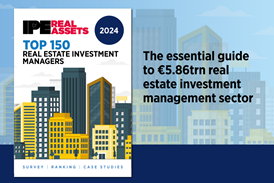The rising tide of UK housing regulation went further this week. Christopher Walker investigates whether it is spooking institutional investors
There is something of a perfect storm in UK housing regulation.

This week saw the second reading of the Renters Reform Bill which has long been trailed but contains much which might worry landlords. It also saw the publication of a from Labour, the opposition party likely to assume power following the next general election, which is expected later this year. The report makes a series of surprising recommendations, including the introduction of rent caps, described as “rental stabilisation” measures.
This comes against a background of ever more stringent energy performance regulations for residential development and rental properties in general. Together with the widespread refurbishment of cladding now being enforced for UK private-rented sector (PRS) properties following the appalling tragedy of the Grenfell Tower fire, and a series of tax measures penalising small private landlords.
Have we got to the stage where regulation is frightening investors? “The UK needs to continue to attract global and domestic investors into the housing sector,” warns Polly Simpson, head of multifamily development at Savills. “New regulations [are] adding to an increased cost base as well as the time to deliver new homes. Certainty over regulatory requirements is essential to ensure the UK remains an attractive place to invest and develop housing.”
The Renters Reform Bill was first mooted by the incumbent Conservative government in 2019. Its principal intention was to forbid ‘no-fault evictions’, under so-called Section 21, whereby a landlord can evict a tenant without a reason, once their fixed-term contact has come to an end. No-fault evictions have been on the rise – last year, there were 9,457, the highest level in seven years and a 49% increase over the previous year.

The bill is getting very close to becoming law, but there have been innumerable amendments, not least over this central aim. The government says the new system will not take place “until we judge sufficient progress has been made to improve the courts”. But as Louise Marin-Bataller, senior associate at law firm Forsters, wonders: “How long could a reform of the court system take? Will it ever happen and will section 21 ever go?” It would seem unlikely during the current government’s lifetime.
There are many other aspects to the Reform Bill, however, which might still have implications if not further amended. Worries around the private student housing market appear to have abated, which is lucky as some of the original proposals regarding changes to notice were quite simply “a minefield” in Marin-Bataller’s opinion.
She remains worried about proposals to stop landlords accepting more than one month’s rent in advance. This could cause problems for foreign renters or those with bad credit histories, who “would normally get around the credit referencing issue by paying six to 12 months’ rent in advance,” Marin-Bataller says. “What will happen to this group of people, particularly when some have suggested that guarantors should also no longer be allowed?”
Tenants could clearly benefit from landlords being unable to serve notice to terminate a lease until six months into the lease term. But unless proposed amendments are accepted, “landlords could be faced with notices served on day one by tenants resulting in short-term lets of two months”. Marin-Bataller wonders: “Will this ultimately lead to landlords leaving the PRS?”
There is no question that the Bill is spooking many of the UK’s two million private small investors, who dominate the UK rental market. Many are now selling up. But what about larger institutional investors?

Ian Fletcher, director of policy at the British Property Federation, says: “There are some proposals around being able to raise rents that are now going to be tougher. Landlords are going to have to use what’s called a section 13 process. So, it’s certainly, a more challenging environment, but for larger institutions, which typically are the kinds of organisations we represent, there’s a lot of things in the bill that they would do as a matter of course anyway.”
Indeed, some welcome the professionalisation of the market. Rick de Blaby, CEO of Get Living – whose owners include institutional investors Aware Super, APG, Oxford Properties, Alecta, Allianz and Local Pensions Partnership – is in support of “legislation that drives up standards”.
He says: “An efficient, transparent and professional rental market should offer benefits for both investors and residents, but the current mismatch in supply and demand has, at the margins, allowed poor landlord behaviour to flourish. We therefore welcome government in bringing forward legislation in the form of the Renters Reform Bill to tackle the short-term issues in the sector.”
One question is why politicians are so focused on supply rather than considering what is happening to demand. “What has grown most has been demand,” says Fletcher. “There has been a lot of household formation after the pandemic, since migration has been strong into the UK. So whilst some small landlords have left the market, the thing that’s really driven prices in the market has been those various demand levers that have created a mismatch between supply and demand.”
The Cowan report’s ‘rental stabilisation’
Even if the Conservatives’ bill ends up being neutered, Labour is committed to ending no-fault evictions and might well introduce further legislation itself post-election. The question arises what else might it do?
Investors had felt reassured that, should it come to power, the party would not introduce rent controls. But on Wednesday a Labour-commissioned report led by Stephen Cowan, councillor of Hammersmith and Fulham, published its findings. Apart from calling for a tell-all register of rental housing, there was a key recommendation that rent rises should be “stabilised”. Any rise would be capped at either consumer price inflation or local wage growth – whichever is lower.

Labour’s official response to the report was to re-emphasise its opposition to rent controls. However, it is divided on this issue. The report’s author was moved to write an op-ed in the Guardian newspaper stating that his report rejected rent controls, describing the measures as “not a cap on rents, but a cap on rent increases”.
Fletcher worries there is “tension” between the Labour Party and some of its mayoral candidates, who over the past year have been vocal in favour of rent controls at a local level. “I would say that local rent controls are probably the worst form of rent control,” he says.
“It would curb my members’ enthusiasm for the market if [Cowan’s] proposal went through. The institutional market is small and relatively nascent here. And I just think that the messaging around rent controls would make the UK an unattractive place to invest.”
Blaby is also concerned. “Not only has it been proven to lower standards and restrict tenancies in markets it has been introduced in, but it will also cause a dramatic drop in the supply of new rental homes,” he says. “Rent controls will undoubtedly damage investor confidence and therefore stall crucial investment.”
Darren Gardner, chief operating officer of Nido, which was recently acquired by Canada Pension Plan Investment Board, agrees but is sanguine. “It still seems unlikely that a new Labour government would introduce rent controls,” he says. “Recent experiences in Ireland and Scotland have illustrated how much these negatively disrupt the market.” He points out that a cap on rent increases in Ireland has “significantly strangled new development.”
Time will tell if this is wishful thinking.

















